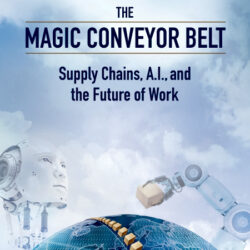A celebration of collaboration at the inaugural UK SCALE

Issues of a global and regional nature were discussed at the inaugural UK SCALE (Supply Chain and Logistics Excellence) Centre Symposium at Loughborough Business School last month. Collaboration was a running theme throughout the day, as the SCALE network aims to create a global collaborative network in which each country pools its supply chain and logistics expertise and collaborates on research projects that focus on real challenges. Thus stated Professor Yossi Sheffi, director of the MIT Center for Transportation & Logistics.
By Sean Culey
MIT’s first SCALE centre opened in 2003, and there are now six Centres of Excellence, including sites in Spain, Luxembourg, China and Colombia. The new SCALE centre at Loughborough aims to connect the UK to this network, becoming the national hub for supply chain and logistics innovation, research, education and industrial collaboration. MIT’s Executive Director, Dr Chris Caplice, highlighted that the SCALE network aims to innovate through research, engage through outreach, and develop through education. He stated that collaboration is critical to resilience and creativity, declaring that ‘innovation happens at the fences’.
Jan Godsell, Loughborough’s Dean and Professor of Operations and Supply Chain Strategy, kicked off with the global challenges, declaring that the extended period of global disruption had left supply chains facing a decision point: do they derisk or decouple? She strongly felt that decoupling through nationalization is not the right approach and instead favours derisking, which she hopes will be achieved by ‘working together to establish ways to progress with purpose and create a better future’.
Collaboration is the key to resilience
Sir John Peace, chair of the Midlands Engine and the ex-chairman of both fashion house Burberry and multinational banking and financial services company Standard Chartered, likewise declared that collaboration is the key to resilience. He also highlighted the mood shift away from globalization, stating that he didn’t want globalization to end but echoed Professor Godsell’s message that for it to survive, it must be derisked and more resilient. While Globalization 1.0 was based around a linear push model with a singular focus on cost reduction, Globalization 2.0 must be more strategically designed, based on networks that include reverse logistics and circularity.
I agree with this, for many supply chains have grown organically through acquisition and expansion rather than through strategic intent. As a result, they are inflexible and unnecessarily complex. Strategically designing the network allows for resilience to be factored in from the start, enabling playbooks to be developed that derisk the supply chain through identifying alternate supply sources and shared logistics opportunities.
‘Thrive in balance’
 The discussion of global-scale issues continued in the afternoon session. Professor Godsell delivered a sobering presentation on the impact of consumption-driven growth, referencing Kate Raworth’s doughnut economics. For those unfamiliar with the model, the centre of the doughnut depicts the proportion of people who lack access to life’s essentials (such as healthcare, food, water, housing, etc.). The crust represents the ecological ceilings (planetary boundaries) that enable life on our planet to continue. The aim is to seek the ‘Goldilocks zone’ in the light green area (see image).
The discussion of global-scale issues continued in the afternoon session. Professor Godsell delivered a sobering presentation on the impact of consumption-driven growth, referencing Kate Raworth’s doughnut economics. For those unfamiliar with the model, the centre of the doughnut depicts the proportion of people who lack access to life’s essentials (such as healthcare, food, water, housing, etc.). The crust represents the ecological ceilings (planetary boundaries) that enable life on our planet to continue. The aim is to seek the ‘Goldilocks zone’ in the light green area (see image).
Professor Godsell finished her speech with a passionate call for our corporate and political leaders to develop a more eco-conscious outlook so it can ‘thrive in balance’. She also called for consumers to separate what they need from what they want. And she declared that we should strive for all countries to be self-sufficient in producing products and services that are critical to life.
I found this somewhat contradictory to her earlier point, when she demonized the concept of decoupling global supply chains and nationalizing production. As I listened, I thought it was a mistake to present the ‘decouple or derisk’ decision as a binary one, as decoupling the supply chain through reshoring or nearshoring could be the best way to derisk.
Priorities of UK supply chain leaders
One thing I liked about the day was that these global issues were interspersed with discussions and concerns of a more local nature. Tim Lawrence, the Director of Digital Supply Chain at the Digital Catapult, shared the results of a 2024 survey of the 500 top UK supply chain leaders. The top three priorities were enhancing efficiency and automation, building resilience against disruptions and developing a more sustainable supply chain.
Lawrence highlighted that digital technology was still a top priority, but the primary barriers to this digitization were all internal, including resource availability, existing process mindset, and work culture. All these factors are within the control of the organization. Despite the passing of many years and thousands of words, culture still enjoys eating strategy for breakfast.
Closing the productivity gap
The discussion then went even more local, focusing on the blight of the Midlands region, where Loughborough is located. Renowned as the birthplace of the Industrial Revolution, the Midlands has fallen on hard times, and its productivity rate is currently 12% below the UK’s national average.
As articulated by Sir Peace, the challenge is to find a way to translate the region’s rich industrial heritage into leading positions in new sectors such as industrial digitization, electric and autonomous vehicles and electrification. The prize is enormous, as closing the 12% productivity gap is estimated to bring an additional £90 billion into the region.
Loughborough also resides in the middle of what is known as the Golden Logistics Triangle, which is so-called because it is within a four-hour drive of 90% of the British population. This explains why so many logistics companies have their national distribution centres (NDCs) there. Located at Loughborough Business School, the UK SCALE centre seems ideally positioned to support this industrial resurrection.
Transition Point?
One thing that interested me was how many discussions touched on issues I highlighted as future concerns six years ago in my book Transition Point. For example, Jo Pick, Chief People Officer at Wincanton, commented that the more manual a job is, the more resilient to automation it is. I made this exact point in the chapter ‘The Time of Keynes’ Grandchildren’, where I highlighted that trades such as plumbing were much more resilient to automation than most digital knowledge and creative work. What makes this concerning is the fact that successive governments have encouraged an entire generation to pursue degrees in subjects that are massively exposed to automation while also pushing them away from technical colleges where they would have learnt skills that are (currently) immune to automation and in high demand.
Antifragile or more fragile?
Jo Pick also highlighted another concern I detailed in my book. I call it ‘The Machine Stops issue’ in reference to a science fiction short story by E.M. Forster initially published in 1909. The issue is that, as AI continues to develop and become embedded within every aspect of our world, we will become increasingly dependent on it, losing skills and the understanding of how things work.
For example, as GenAI tools become better at writing than most humans, we will rely on them to write for us, eroding our literacy skills. Don’t believe me? Consider GPS systems now in our cars and phones. Due to this technology, people no longer read maps and follow signs, relying on satnav automation to guide them instead. However, should it malfunction mid-route, most people wouldn’t have a physical map and the skills to read it, leaving them struggling to identify where they were, let alone how to get to their destination.
Now imagine if the world becomes utterly dependent on machines to run most aspects of our world – from driving us around to producing our goods and services. Are we resilient enough to adapt should these machines suddenly stop? Are we becoming antifragile? Or more fragile? I think we all know the answer. The reality is that, should we ever face some form of technology blackout, most Westerners would struggle to survive, whereas those living the most basic of lives would thrive.
The new coffee clubs
One point I made in the first section of Transition Point was how clubs – specifically coffee clubs – were one of the unique catalysts leading to the Industrial Revolution in Britain. The emergence of these clubs provided both the facilities and freedom for people from different groups to sit together and discuss everything from politics to local gossip. This ability to converse and collaborate was frowned upon elsewhere for fear that people would criticize or conspire against their leaders. However, in Britain, it enabled an environment where men of invention, industry and investment could freely connect and collaborate to turn ideas into a profitable reality. The rest, as they say, is history.
Now, we find ourselves in the middle of another industrial revolution, one that presents a new wave of issues and opportunities. So a globally connected coffee house, where people in industry, innovation and investment can connect and collaborate to solve problems and overcome challenges, sounds like a very good idea indeed.
However, a word of warning: as Professor Yossi Sheffi himself stated, ‘When everything is said and done, a lot more is said than done’. Therefore, I hope the new UK SCALE Centre will move beyond conversation and into a new realm of creativity and collaboration that generates real-world outcomes with impact. Personally, I think this sounds like an exciting endeavour and a positive result for Loughborough Business School, MIT and the UK.










